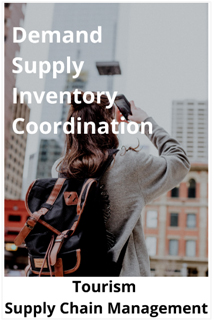Tourism & SCM Time to be prepared
One of the most affected industry due to COVID 19 pandemic is the travel and tourism industry. According to a recent survey conducted by the World Travel and Tourism Council, an estimated 100 million jobs have been lost due to the pandemic. Some countries which are solely dependent on tourism, have been majorly impacted.
We cannot keep wilting under the fear of the pandemic,but slowly and carefully will have to restart the economises, and the tourism sector will play a major role in the restart.
Tourism is important…
There have been multiple claims in the news like ‘X festival generated Y amount for the community’, ‘Z number of jobs were created during recent tourism season’. It has been proven that tourism has a ‘multiplier effect’ on the economy.
With the gradual reopening of economies, tourism will also get a booster. However, there will be tremendous competition, as all the operators will be eyeing a piece of the pie. With the given limitation like limited budgets of tourists, high expectations, also steps like social distancing, sanitization, temperature checks etc. the tourism sector will have to optimize its processes for the ‘New normal’.
To keep ahead of the competition, effective tourism supply chain management (TSCM)will be required.
Need for TSCM

Let’s refer to an example; due to non-availability of fuel a jet ski is not operational. A tourist looking forward to that jet ski ride is disappointed. This would probably spoil his whole trip, if not at least the day. Resulting in bad reviews over the social network, which in turn would impact tourist inflow who are planning to visit the tourist destination.
The above example points at various elements:
- Stock & Inventory control.
- Preventive Maintenance.
- Demand management.
- Customer Fulfilment.
Basic elements of Supply Chain Management.
It is believed that successful SCM practices applied in other industries, could be applied to the tourism industry. The key is to consider the pertinent issues and characteristics of the tourism industry. The
tourism industry is complex by nature, various stakeholders interact with each other all of which have their objectives and processes, therefore the implementation of TSCM has immense benefits.
Supply chain management (SCM) is extensively used in the manufacturing and eCommerce industry. The objective is to improve efficiency across the value chain. SCM identifies the key interdependencies and explores possibilities to improve efficiencies.
To implement a successful TSCM it is important to understand the characteristics of the tourism industry:
| Coordination: | Tourism is an extremely co-ordination intensive industry. Multiple products andservices are bundled together to form a single tour. |
| Seasonal: | There are ‘On’ & ‘Off’ seasons in tourism. Short periods when a high amount of business is generated. |
| Hyper Communicative: | Tourists have to ‘experience’ a destination or a tour. Therefore, potential tourists can decide only based on information provided by tour operators. |
| Uncertainty: | This has been proved during the recent pandemic. The tourism industry just ‘shut down’. There could also be natural calamities, economic downturns etc. which have a direct impact on tourism. |
Considering the above characteristics following areas for TSCM implementation can be identified
| Demand Management | Supply Management | Inventory management | Coordination |
|---|---|---|---|
| Tourism business flourishes on demand. Therefore, intelligent demand forecasting is important | Tourists expect a lot at competitive costs. Cost of supplies and availability is important which requiresefficient supplier relationship management | Being seasonal in nature, stocking up of supplies well advance is necessary. | As said earlier, the success of tourism lies in the efficient coordination between various stakeholders. |
Information Technology is the solution
Understanding the areas of importance in Tourism Supply Chain Management, it is obvious that an omnichannel, cloud-based platform providing intelligent analytics and coordination tools is the need of the industry.
People Plus Software Inc. is one of the leaders in developing Supply Chain management software. Its iM3 SCM suite is an Integrated Supply Chain Management solution which will help in organising and automating processes like supply and inventory management, asset & equipment management, inventory control and many more operations relevant to the tourism industry. Being a cloud-based platform, it also works as an omnichannel coordination tool for the various stakeholders.
In the ‘New normal’ tourism will be preferred industry for economic development. If your business is part of the Tourism industry, its time you were prepared to manage the demand.



